Angels & Demons
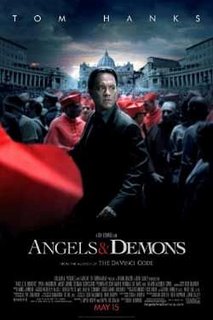 A sequel offers a chance for the filmmakers to correct the things they did wrong the first time around. Lord knows that 2006's screen version of The Da Vinci Code had plenty of room for improvement. With the follow up, Angels & Demons, returning director Ron Howard decided to pay attention to one crucial criticism a lot of people had with the first film - Tom Hanks' hair. Everything else has pretty much remained the same. Of all the things that needed to be fixed, the lead actor's hair should have been the last thing on anyone's list.
A sequel offers a chance for the filmmakers to correct the things they did wrong the first time around. Lord knows that 2006's screen version of The Da Vinci Code had plenty of room for improvement. With the follow up, Angels & Demons, returning director Ron Howard decided to pay attention to one crucial criticism a lot of people had with the first film - Tom Hanks' hair. Everything else has pretty much remained the same. Of all the things that needed to be fixed, the lead actor's hair should have been the last thing on anyone's list. 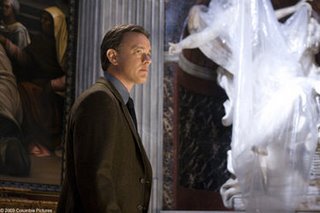 As a thriller, Angels & Demons is a lot like a dog chasing its own tail. It does a lot of running around without really accomplishing anything. But for some bizarre reason, screenwriters David Koepp (Ghost Town) and Akiva Goldsman (I Am Legend), have decided to slow the pace down to the point that we're watching it run around without really accomplishing anything in slow motion. At times, the screenplay resembles an experiment to see how much they can slow the movie down before it comes to a complete stop. It would be different if it used this to its advantage to create atmosphere, or maybe some characters we could care about, but no. Harvard University symbologist Robert Langdon (Hanks) is recruited by the Vatican to help track down and rescue the four candidates that are likely to become the successor to the recently deceased Pope. A group claiming to be associated with the underground society of the Illuminati are claiming responsibility for the kidnapping, and are threatening to kill each kidnapped cardinal starting at 8 PM that very night, each one dying each hour. Not only this, but the Illuminati have also stolen a bomb made of antimatter that is set to go off at midnight. If it explodes, it will take all of Vatican City and part of Rome with it.
As a thriller, Angels & Demons is a lot like a dog chasing its own tail. It does a lot of running around without really accomplishing anything. But for some bizarre reason, screenwriters David Koepp (Ghost Town) and Akiva Goldsman (I Am Legend), have decided to slow the pace down to the point that we're watching it run around without really accomplishing anything in slow motion. At times, the screenplay resembles an experiment to see how much they can slow the movie down before it comes to a complete stop. It would be different if it used this to its advantage to create atmosphere, or maybe some characters we could care about, but no. Harvard University symbologist Robert Langdon (Hanks) is recruited by the Vatican to help track down and rescue the four candidates that are likely to become the successor to the recently deceased Pope. A group claiming to be associated with the underground society of the Illuminati are claiming responsibility for the kidnapping, and are threatening to kill each kidnapped cardinal starting at 8 PM that very night, each one dying each hour. Not only this, but the Illuminati have also stolen a bomb made of antimatter that is set to go off at midnight. If it explodes, it will take all of Vatican City and part of Rome with it. 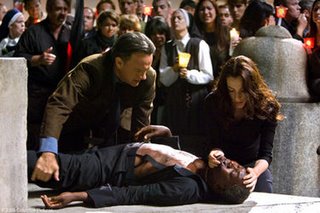 With such dire circumstances, you would expect Langdon to be in a race against time to stop mass destruction, but you would be wrong. He and the supporting characters have plenty of time to stand around and discuss the plot in long, labored dialogue scenes that not only slow the movie down, but are written almost entirely in cliches. Langdon is hired due to his knowledge of the history behind the Illuminati, and their long battle with the Catholic church. He hardly needs this knowledge, however, as he seems to have the unique ability to stumble upon the right clue at the right time, which is of course hidden from everyone else. Watching the movie, I couldn't help but think of the National Treasure films, where Nicholas Cage plays a man who can solve numerous centuries-old mysteries and riddles in a matter of seconds just by glancing at them. The coincidences the screenplay asks us to believe as Langdon follows one clue to the next border on laughable. As the story grew more convoluted and the contrivances kept on piling up, my mind started to focus on the characters, hoping that there would be someone that could hold my attention.
With such dire circumstances, you would expect Langdon to be in a race against time to stop mass destruction, but you would be wrong. He and the supporting characters have plenty of time to stand around and discuss the plot in long, labored dialogue scenes that not only slow the movie down, but are written almost entirely in cliches. Langdon is hired due to his knowledge of the history behind the Illuminati, and their long battle with the Catholic church. He hardly needs this knowledge, however, as he seems to have the unique ability to stumble upon the right clue at the right time, which is of course hidden from everyone else. Watching the movie, I couldn't help but think of the National Treasure films, where Nicholas Cage plays a man who can solve numerous centuries-old mysteries and riddles in a matter of seconds just by glancing at them. The coincidences the screenplay asks us to believe as Langdon follows one clue to the next border on laughable. As the story grew more convoluted and the contrivances kept on piling up, my mind started to focus on the characters, hoping that there would be someone that could hold my attention.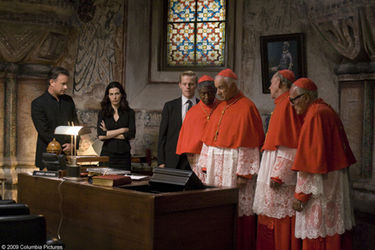 There's a rather large supporting cast either supporting Langdon, or standing in his way. Chief amongst them is a scientist named Vittoria Vetra (Ayelet Zurer), who was originally one of the head people in the antimatter project before it was stolen from the lab, and is now aiding Langdon in his search. We learn nothing about her outside of the plot, and the extent of her help is to steal something from the Vatican Archives for him, so there's little to hold our attention there. Representing the Vatican is a cop named Olivetti (Pierfrancesoco Favino), the head of the Swiss Guard (Stellan Skarsard), and a young priest who was close to the former Pope named Camerlengo Patrick McKenna (Ewan McGregor). We also learn nothing about them outside of what is necessary to the plot. These are people who exist solely to be manipulated by the screenplay, and hold no discernable personality or interests, so the actors often seem to be at a loss as to what they're supposed to be doing. We don't even get to learn anything about Robert Langdon himself, which leads to a rare performance from Tom Hanks where he seems to be here simply because the last movie made money. He's cashing a paycheck here.
There's a rather large supporting cast either supporting Langdon, or standing in his way. Chief amongst them is a scientist named Vittoria Vetra (Ayelet Zurer), who was originally one of the head people in the antimatter project before it was stolen from the lab, and is now aiding Langdon in his search. We learn nothing about her outside of the plot, and the extent of her help is to steal something from the Vatican Archives for him, so there's little to hold our attention there. Representing the Vatican is a cop named Olivetti (Pierfrancesoco Favino), the head of the Swiss Guard (Stellan Skarsard), and a young priest who was close to the former Pope named Camerlengo Patrick McKenna (Ewan McGregor). We also learn nothing about them outside of what is necessary to the plot. These are people who exist solely to be manipulated by the screenplay, and hold no discernable personality or interests, so the actors often seem to be at a loss as to what they're supposed to be doing. We don't even get to learn anything about Robert Langdon himself, which leads to a rare performance from Tom Hanks where he seems to be here simply because the last movie made money. He's cashing a paycheck here.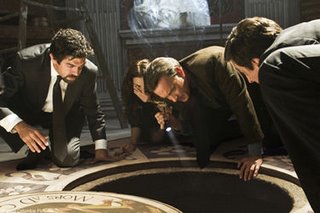 It must be said, Angels & Demons has an attractive look, thanks to the cinematography by Salvatore Totino. We get some beautiful shots of Roman churches, but that leads to yet another problem. Due to the strangely sluggish pace, we feel like we're watching a travelogue instead of a race-against-time thriller with thousands, perhaps millions, of lives at stake. It's not enough to take our minds off the fact that very little is going on, and what is happening is genuinely ludicrous. Yes, it's a good looking movie, but to what end? If there's nothing underneath, it easily collapses in on itself. The plot is built on a shaky foundation that leads to a twist ending, when the true mastermind is revealed. It must be said, the reveal is highly anticlimactic, particularly with how contrived the discovery is made. In a movie that is built upon coincidences, the last 10 or 15 minutes go beyond the breaking point.
It must be said, Angels & Demons has an attractive look, thanks to the cinematography by Salvatore Totino. We get some beautiful shots of Roman churches, but that leads to yet another problem. Due to the strangely sluggish pace, we feel like we're watching a travelogue instead of a race-against-time thriller with thousands, perhaps millions, of lives at stake. It's not enough to take our minds off the fact that very little is going on, and what is happening is genuinely ludicrous. Yes, it's a good looking movie, but to what end? If there's nothing underneath, it easily collapses in on itself. The plot is built on a shaky foundation that leads to a twist ending, when the true mastermind is revealed. It must be said, the reveal is highly anticlimactic, particularly with how contrived the discovery is made. In a movie that is built upon coincidences, the last 10 or 15 minutes go beyond the breaking point.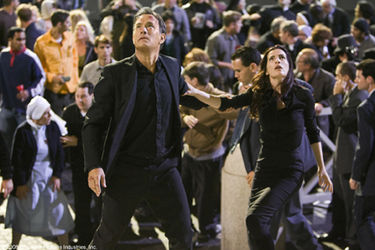
See the movie times in your area or buy the DVD at Amazon.com!






0 Comments:
Post a Comment
<< Home